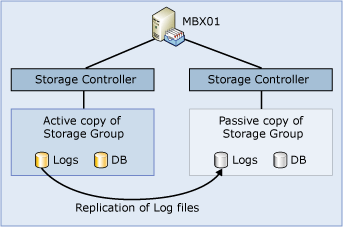Exchange Replication Test
Cluster continuous replication (CCR) is a high availability feature of Microsoft Exchange server 2007/2010 that combines the asynchronous log shipping and replay technology built into Exchange 2007/2010 with the failover and management features provided by the Cluster service.
CCR uses the database failure recovery functionality in Exchange 2007/2010 to enable the continuous and asynchronous updating of a second copy of a database with the changes that have been made to the active copy of the database. During installation of the passive node in a CCR environment, each storage group and its database is copied from the active node to the passive node. This operation is called seeding, and it provides a baseline of the database for replication. After the initial seeding is performed, log copying and replay are performed continuously.
In a CCR environment, the replication capabilities are integrated with the Cluster service to deliver a high availability solution
Local continuous replication (LCR) is a single-server solution that uses built-in asynchronous log shipping and log replay technology to create and maintain a copy of a storage group on a second set of disks that are connected to the same server as the production storage group. The production storage group is referred to as the active copy, and the copy of the storage group maintained on the separate set of disks is referred to as the passive copy.
The following figure illustrates a basic deployment of LCR:

Figure 1 : A basic LCR deployment
This test monitors the health of the replication in both LCR and CCR.
Target of the test : A server configured with the Mailbox role
Agent deploying the test : An internal agent
Outputs of the test : One set of results for the Mailbox server being monitored.
| Parameters | Description |
|---|---|
|
Test Period |
How often should the test be executed. |
|
Host |
The IP address of the Mailbox server. |
|
Port |
The port number through which the Mailbox server communicates. The default is 6001. |
| Measurement | Description | Measurement Unit | Interpretation |
|---|---|---|---|
|
Replay queue length |
Indicates the number of log generations currently waiting to be replayed. |
Number |
|
|
Copy queue length |
Indicates the number of log files currently waiting to be copied and inspected. |
Number |
A high value of this measure could indicate that Exchange database copy failed. Under such circumstances, do the following:
|